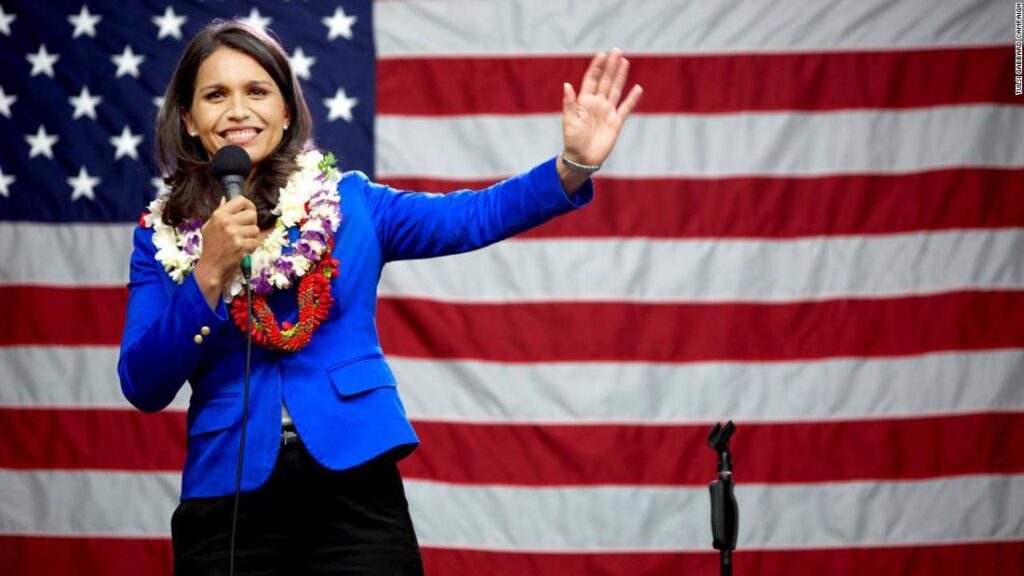In the fast-paced world of politics, new faces and names seem to emerge constantly, each one adding a unique twist to the ever-evolving landscape. One such name that has recently garnered attention is Tulsi Gabbard, who has been tapped by President Trump to potentially serve as the Director of National Intelligence. Before diving into the implications of this potential appointment, it’s important to understand who Tulsi Gabbard is and what she brings to the table. Let’s take a closer look at the background and qualifications of Trump’s pick for this crucial position.
– Background and Experience of Tulsi Gabbard
Tulsi Gabbard is a former U.S. Representative from Hawaii who has a unique background and experience that sets her apart from other candidates. Gabbard served in the Hawaii Army National Guard for over 15 years, deploying twice to the Middle East. Her military service gives her a deep understanding of national security issues, making her a strong candidate for the position of Director of National Intelligence.
Furthermore, Gabbard’s experience as a member of the House Foreign Affairs and Armed Services Committees has allowed her to develop a comprehensive understanding of global affairs. She has been a vocal advocate for ending ”forever wars” and promoting diplomacy over military intervention. Gabbard’s commitment to putting America’s interests first and her willingness to challenge the status quo make her a bold choice for the role of Director of National Intelligence.
– Controversies Surrounding Her Nomination
One of the main controversies surrounding Tulsi Gabbard’s nomination as Trump’s pick for Director of National Intelligence is her past foreign policy positions. Critics point to her previous stance on Syria, where she met with President Bashar al-Assad and expressed skepticism about US intervention in the region. This has raised concerns about her ability to lead intelligence efforts in a complex and volatile geopolitical landscape.
Another source of controversy is Gabbard’s record on LGBTQ rights. Despite her recent apologies and reassurances of support for the community, her past statements and actions have sparked backlash from LGBTQ advocates. This has led to questions about her commitment to upholding the rights and protections of all Americans, as well as concerns about her ability to represent diverse perspectives within the intelligence community.
| Pros | Cons |
|---|---|
| Experience as a congresswoman | Past foreign policy controversies |
| Background in military service | Questions about LGBTQ rights record |
| Independence from party politics | Concerns about representing diverse perspectives |
– Potential Impact on National Security
Tulsi Gabbard’s potential appointment as Director of National Intelligence could have significant implications for national security. As a former military officer and member of the House Armed Services and Foreign Affairs Committees, Gabbard brings a wealth of experience in defense and foreign policy to the table. Her understanding of global threats and diplomatic relations could help shape intelligence priorities and enhance the country’s security posture.
However, Gabbard’s controversial stances on certain international issues may also raise concerns about the impact on national security. Her opposition to military intervention in Syria and support for dialogue with adversaries like Russia have sparked debate among policymakers. Critics worry that her non-interventionist approach could weaken U.S. alliances and embolden hostile regimes. It remains to be seen how Gabbard’s leadership would navigate these complex geopolitical challenges while safeguarding the nation’s security interests.
- Recommendations for Evaluating Her Qualifications
When evaluating Tulsi Gabbard’s qualifications for the position of Director of National Intelligence, it is essential to consider her extensive experience in the military and government. Gabbard served in the Hawaii Army National Guard and was deployed to Iraq, gaining firsthand knowledge of national security issues. This background provides her with a unique perspective on the challenges facing the intelligence community.
Additionally, her tenure as a member of the House of Representatives gives her insight into the legislative process and the ability to work effectively with Congress. Gabbard’s diverse background and understanding of both national security and government operations make her a strong candidate for the role of Director of National Intelligence.
Key Takeaways
as Tulsi Gabbard’s nomination to be Director of National Intelligence awaits confirmation, it is important to stay informed on her background, experience, and policies. Whether you support her appointment or have reservations, being knowledgeable about the individual tasked with leading our nation’s intelligence agencies is crucial. Keep a close watch on her confirmation process and stay engaged in the discussions surrounding her potential role in shaping the future of our national security. Thank you for reading and stay tuned for updates on this developing story.


